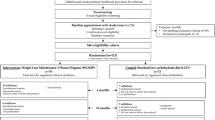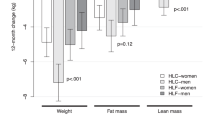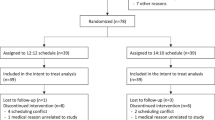Abstract
Objective:
To evaluate the rate of remission of metabolic syndrome (Met Syn) among patients undergoing a brief, low-calorie lifestyle change weight loss intervention and to compare the baseline characteristics of patients who were remitted and not remitted from Met Syn at post-treatment.
Research Methods and Procedures:
Obese adults (N=36) meeting criteria for Met Syn enrolled in an outpatient fee-for-service behavioral weight loss intervention. Participants were assessed on key Met Syn variables (waist circumference, blood pressure, triglycerides, high-density lipoprotein (HDL) cholesterol and fasting blood glucose) at pre- and post-treatment.
Results:
The majority of patients (61%) responded to treatment after a 9.9% mean weight loss. Although Met Syn responders did not differ significantly from Met Syn non-responders on any baseline Met Syn criterion variable, responders had significantly lower baseline body mass indices (BMI; kg/m2) and met criteria for fewer baseline Met Syn variables. As expected, Met Syn responders, compared with Met Syn non-responders, had significantly lower post-treatment waist circumference, systolic and diastolic blood pressures, triglycerides and fasting blood glucose. Patient groups did not differ significantly on weight lost (kg or %), or on the proportion of patients losing ⩾10% of initial body weight.
Discussion:
In a community population, Met Syn responds to weight loss through a low-calorie lifestyle intervention; for some patients, however, the recommended 10% weight loss may not be enough for Met Syn remission.
This is a preview of subscription content, access via your institution
Access options
Subscribe to this journal
Receive 12 print issues and online access
$259.00 per year
only $21.58 per issue
Buy this article
- Purchase on Springer Link
- Instant access to full article PDF
Prices may be subject to local taxes which are calculated during checkout

Similar content being viewed by others
References
Expert Panel on Detection, Evaluation, and Treatment of High Blood Cholesterol in Adults. Executive summary of the third report of the National Cholesterol Education Program (NCEP) Expert Panel on Detection, Evaluation, and Treatment of High Blood Cholesterol in Adults (Adult Treatment Panel III). JAMA 2001; 285: 2486–2497.
Ford ES, Giles WH, Dietz WH . Prevalence of the metabolic syndrome among US adults. JAMA 2002; 287: 356–359.
Park Y-W, Zhu S, Palaniappan L, Heshka S, Carnethon MR, Heymsfield SB . The metabolic syndrome: prevalence and associated risk factor findings in the US population from the Third National Health and Nutrition Examination Survey, 1988–1994. Arch Intern Med 2003; 163: 427–436.
Han TS, Williams K, Sattar N, Hunt KJ, Lean MEJ, Haffner SM . Analysis of obesity and hyperinsulinemia in the development of metabolic syndrome: San Antonio Heart Study. Obes Res 2002; 10: 923–931.
Isomaa B, Almgren P, Tuomi T, Forsen B, Lahti K, Nissen M et al. Cardiovascular morbidity and mortality associated with the metabolic syndrome. Diabetes Care 2001; 24: 683–689.
Grundy SM, Cleeman JI, Daniels SR, Donato KA, Eckel RH, Franklin BA et al. Diagnosis and management of the metabolic syndrome. an American Heart Association/National Heart, Lung, and Blood Institute scientific statement. Circulation 2005; 112: 2735–2752.
Buestto L, Sergi G, Enzi G, Segato G, DeMarchi F, Foletto M et al. Short term effects of weight loss on the cardiovascular risk factors in morbidly obese patients. Obes Res 2004; 12: 1256–1263.
Wolf AM, Beisiegel U, Kortner B, Kuhlmann H . Does gastric restriction surgery reduce the risks of metabolic diseases? Obes Surg 1998; 8: 9–13.
Kreijs GJ . Metabolic benefits associated with sibutramine therapy. Int J Obes 2002; 26: S34–S37.
Orchard TJ, Temprosa M, Goldberg R, Haffner S, Ratner R, Marcovina S et al. The effect of metformin and intensive lifestyle intervention on the metabolic syndrome: the Diabetes Prevention Program randomized trial. Ann Intern Med 2005; 142: 611–619.
Després J, Golay A, Sjöström L, Rimonabant Obesity-Lipids Study Group. Effects of rimonabant on metabolic risk factors in overweight patients with dyslipidemia. N Engl J Med 2005; 353: 2121–2134.
Phelan S, Wadden TA, Berkowitz RI, Sarwer DB, Womble LG, Cato RK et al. Impact of weight loss on the metabolic syndrome. Int J Obes 2997; 31: 1442–1448.
Sjöström L, Lindroos AK, Peltonen M, Torgerson J, Bouchard C, Carlsson B et al. Lifestyle, diabetes, and cardiovascular risk factors 10 years after bariatric surgery. N Engl J Med 2004; 351: 2683–2693.
Goldstein DI . Beneficial health effects of modest weight loss. Int J Obes 1992; 16: 397–415.
Case CC, Jones PH, Nelson K, O’Brian Smith E, Ballantyne CM . Impact of weight loss on the metabolic syndrome. Diabetes Obes Metab 2002; 4: 407–414.
Kahn R, Buse J, Ferrannini E, Stern M . The metabolic syndrome: time for a critical appraisal. Joint statement from the American Diabetes Association and the European Association for the Study of Diabetes. Diabetes Care 2005; 28: 2289–2304.
Duncan GE, Li SM, Zhou XH . Prevalence and trends of a metabolic syndrome phenotype among U.S. adolescents, 1999–2000. Diabetes Care 2004; 27: 2438–2443.
Madan AK, Orth W, Ternovits CA, Tichansky DS . Metabolic syndrome: yet another co-morbidity gastric bypass helps cure. Surg Obes Rel Dis 2006; 2: 48–51.
Lee WJ, Huang MT, Wang W, Lin CM, Chen TC, Lai IR . Effects of obesity surgery on the metabolic syndrome. Arch Surg 2004; 139: 1088–1092.
Martin CK, O’Neil PM, Binks M . An attempt to identify predictors of treatment outcome in two comprehensive weight loss programs. Eat Behav 2002; 3: 239–248.
Stern L, Iqbal N, Seshadri P, Chicano KL, Daily DA, McGrory J et al. The effects of low-carbohydrate versus conventional weight loss diets in severely obese adults: one-year follow-up of a randomized trial. Ann Intern Med 2004; 140: 778–785.
Leidy HJ, Carnell NS, Mattes RD, Campbell WW . Higher protein intake preserves lean mass and satiety with weight loss in pre-obese and obese women. Obesity 2007; 15: 421–429.
Pelkman CL, Fishell VK, Maddox DH, Pearson TA, Mauger DT, Kris-Etherton PM . Effects of moderate-fat (from monosaturated fat) and low-fat weight-loss diets on the serum lipid profile in overweight and obese men and women. Am J Clin Nutr 2004; 79: 204–212.
Yancy WS, Olsen MK, Guyton JR, Bakst RP, Westman EC . A low carbohydrate, ketogenic diet versus a low-fat diet to treat obesity and hyperlipidemia. Ann Intern Med 2004; 140: 769–777.
Limieux I, Lamarche B, Couillard C, Pascot A, Cantin B, Bergeron J et al. Total cholesterol/HDL cholesterol ratio vs LDL cholesterol/HDL cholesterol ratio as indices of ischemic heart disease risk in men. Arch Int Med 2001; 161: 2685–2692.
Acknowledgements
We thank Susan M Pechon, RN, for her assistance with obtaining patient measures and Audra L Raus, RD, for her contributions to the development of the program and its diet.
Author information
Authors and Affiliations
Corresponding author
Rights and permissions
About this article
Cite this article
Lundgren, J., Malcolm, R., Binks, M. et al. Remission of metabolic syndrome following a 15-week low-calorie lifestyle change program for weight loss. Int J Obes 33, 144–150 (2009). https://doi.org/10.1038/ijo.2008.225
Received:
Revised:
Accepted:
Published:
Issue Date:
DOI: https://doi.org/10.1038/ijo.2008.225
Keywords
This article is cited by
-
Effects on cardiovascular risk factors of weight losses limited to 5–10 %
Translational Behavioral Medicine (2016)
-
‘Red Ruby’: an interactive web-based intervention for lifestyle modification on metabolic syndrome: a study protocol for a randomized controlled trial
BMC Public Health (2014)
-
Remission of screen-detected metabolic syndrome and its determinants: an observational study
BMC Public Health (2012)
-
Worksite health screening programs for predicting the development of Metabolic Syndrome in middle-aged employees: a five-year follow-up study
BMC Public Health (2010)



